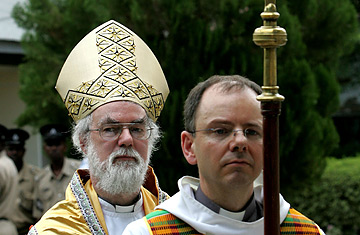
Anglican Archbishop Rowan Williams of Canterbury, left, arrives for the Solemn Eucharist, Sunday, Feb. 18, 2007, at the Anglican cathedral in Zanzibar.
The 38 primates of the Anglican Communion, the 77-million member body that includes the Episcopal Church in the U.S., gave the Episcopalians (with 2.2 million members) less than eight months to swear off officiating at gay commitment ceremonies and set in motion a system of "alternative oversight" for Episcopal congregations so disgruntled with the positions of the American church that they have been demanding their own set of conservative bishops as the price of staying within the church. Archbishop of Canterbury Rowan Williams, Anglicanism's first primate among equals and the man responsible for trying to hold the Communion together, made it clear in a press conference that he supported the communique.
Prior to the move, most observers thought that there were only two vehicles to resolve the differences between Anglican conservatives and American Episcopaliansim — which in 2003 made an openly gay man bishop, in contravention of a 1998 Communion statement that only married heterosexuals should have sex, and has refused to swear off gay union ceremonies. The slow one was a new Anglican core covenant to the margins over a period of years. The fast one was an explosive schism of the worldwide communion into halves: the conservative party, led out of Africa, with the majority of members; and a more liberal one in agreement with the Episcopal Church, with most of the money.
Yesterday's action was a more surprising third way. By allotting the Episcopal leadership less than a year to back off of gay unions (or face taking a second-class status within the global group), the Communion has made it clear that it values its unity more than American participation (and funding). And in establishing "alternative oversight" by bishops more to the liking of U.S. conservatives — under a complicated system that still gives Episcopalian Presiding Bishop Katherine Jefferts Schori some say in their regulation — the Communion has engaged in unusual interference with the polity of a member church. But it has also hinted that it would prefer that Episcopalianism remain the main U.S. Anglican branch, provided it is willing to accommodate some more conservative leaders.
What's fascinating about all of this is that Jefferts Schori appears to have been involved in putting together parts of this solution, which suggests that she is committed to making them work. If so, she will face stiff opposition from many U.S. Episcopalians, who would probably prefer second-class status —or no status at all — in the Communion, rather than retreating from a position on homosexuality that they feel more closely reflects the spirit of the Gospel than the exclusionary position of the majority of the primates.
As a sign of the Communion's desire that Epicopalianism stay in one piece under the world leadership, the primates' communique also urged against litigation over church buildings and property between the Episcopal church and some of its runaway parishes. That is a lovely sentiment. But its premise — that American conservatives and liberals will end up living together in relative harmony under the banner of an Episcopal Church that somehow still responds to the wishes of the Communion — may prove tragically unfounded.
